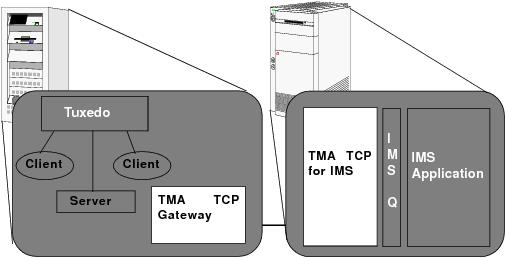1.3 Oracle TMA TCP for IMS Architecture
IMS Open Transaction Manager Access (OTMA) is a transaction-based, connectionless client/server protocol. By using OTMA, each client (z/OS application) can submit transactions to IMS or issue IMS commands and receive output from IMS application programs and from IMS itself.
An OTMA client is a z/OS application program that sends transactions to an IMS server and receives output. The application program must be a member of an XCF group and uses the OTMA protocol.
The TMA TCP for IMS product executes as an OTMA client running under z/OS. It uses the z/OS TCP/IP Sockets API to communicate with a TMA TCP Gateway on a remote Oracle Tuxedo system, and the IMS message queue (directly or indirectly through OTMA) to communicate with IMS transactions. This product supports connectivity with remote TMA TCP Gateways, TMA TCP for CICS gateways, or other TMA TCP for IMS gateways. The following figure illustrates connection with a remote TMA TCP Gateway.
Figure 1-1 The Oracle TMA TCP for IMS Interoperability Solution

The configuration definition of the TMA TCP Gateway in the remote Oracle Tuxedo system maps Oracle Tuxedo local services to remote services provided by the IMS gateway. Each remote service corresponds to an IMS server transaction. Service requests issued by clients in the Oracle Tuxedo system are routed through the TMA TCP Gateway to the TMA TCP for IMS gateway for processing by the appropriate IMS server transaction.
Similarly, the configuration definition in the TMA TCP for IMS gateway maps local service names to remote services provided by the Oracle Tuxedo system. Service requests issued by IMS client transactions are routed to the TMA TCP Gateway for processing by the appropriate Oracle Tuxedo service.
In both cases, access to a remote service is transparent to the client requesting the service.